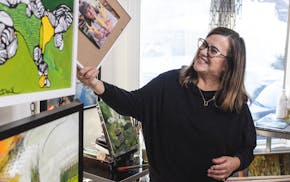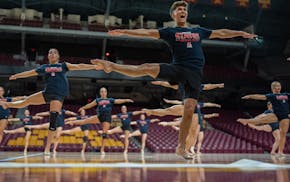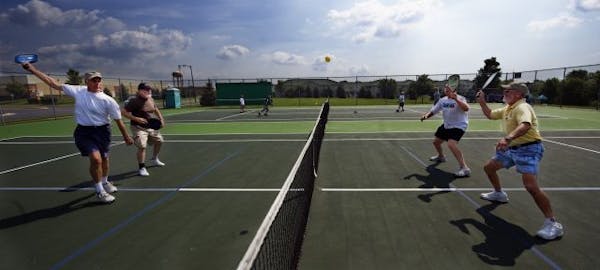Amrik Donkena might be a tad irked if you try to tell him that he's playing pickleball the wrong way.
Purists sometimes call former tennis players like Donkena "bangers," those who consistently prefer aggressive, fast-paced drives, rather than dropping it more gently at the net. Some have offered to help him finesse his soft game.
"The biggest misconception is you have to play a certain way to win," he says. "No, you do whatever you need to win."
Athletes like Donkena are part of the upper echelon in Minnesota's mostly populist pickleball ecosystem. The 32-year-old and his occasional doubles partner, Aanik Lohani, 24, are among a handful of professional pickleball players in the state, representing an elite faction of a sport better known for its recreational play that may or may not involve beer, your mom or your neighbor's driveway.
The two have both traded in their tennis racquets and just last year dipped their paddles into the professional pickleball scene. And when you watch this duo on the court, there's nothing leisurely about their playing style.
"This is the future, for sure," says Fuyei Xaykaothao, founder of Twin Cities-based PikNinja Sports, a pickleball paddle and gear company. "It's going so much faster. It's such an aggressive, explosive game. With the introduction of all these high-level tennis players, their hands are so good that you have to adapt."
But what does it mean to go pro? Most players in Minnesota aren't quitting their day jobs. Prize money doesn't pay well enough, unless you're among the best in the world. But sponsorships are filling in the gap as companies finance player training, travel and tournament fees.
Minnesota's Chad Flynn, for example, is sponsored by juggernaut paddle company Selkirk. (At a national tournament in Lakeville last month, Flynn's doubles partner, Paul Salmela, won the senior pro division.) Up-and-comers Sammy Lee and Ivy Tschetter are still in their teens, carrying the potential to shape and grow with a young sport.
I recently caught up with Donkena and Lohani, who are both busy guys. Donkena is a chemistry teacher at Prior Lake High School and a new dad, and Lohani is a data engineer at U.S. Bank. They also teach pickleball on the side — Donkena works at Mega Pickle and Pong in Chanhassen, and you can find Lohani coaching at Life Time. Here are some highlights of our chat, edited for length and clarity:
First played in gym class
Donkena: I had initially played it with a wooden paddle with my high school gym teacher, but didn't really think much of it or care to even remember the name.
Lohani: It was in eighth grade. I remember our gym teacher wanted us to play this sport called pickleball, and we partnered up. The prize was a jar of pickles, which I ended up actually winning.
How they got hooked
Donkena: I was just five years out of college and still in good athletic shape, and some older guys absolutely dusted me on the pickleball court. Two summers ago, I started playing regularly. That fall is when I took it more seriously and played my first tournament.
Lohani: One of my friends on the club tennis team at the U of M introduced me to it. So I went to Target, bought a paddle for $9.99, and went out to our local courts. It was March, so we shoveled off just one court. I just really loved playing. It satisfied my need for competition, but it also brought a lot of social aspects to the game.
On being a pro
Donkena: I think of myself as semi-pro now. I'm on the pro tour, but doing it haphazardly. Whatever my ambitions were, I had to take a step back — which I'm happy with — because my family grew. But the biggest piece is the resources: Do you have the time and the facilities?
Lohani: And the effort, too, right? You're probably not getting much sleep at night.
Donkena: Since I've had my daughter, I'm probably training six hours a week total. Having a full-time job is not very conducive to an actual professional pickleball career.
Lohani: A lot of people think, "Oh, you're pickleball coaching. That's a lot of time on the court." But it's not time working on your game. I'm trying to play a lot more tournaments. I play about three times a week in high-competitive games, and once a week I'll drill. I'm trying to do more off-court training, like calisthenics or cardio, and pickleball-specific movements.
On brand-building
Lohani: I've started to partner with a local sports talent agency and ride the momentum of the last couple of tournaments. We're trying to garner sponsorships with big-name companies to help me put in that extra time and get financial backing so I can play in these tournaments and solidify myself as a pro on the tour. In pickleball, I feel like the players sometimes need to be more than the sport itself, whereas in the NFL, the NFL is the big thing.
Pickleball perception problems
Lohani: You see all of the comments on Facebook or Instagram posts, like "This looks so easy." Anyone can step on the court, but to really be able to hang, you need to understand the game and the intricacies of the play itself.
Donkena: When I first started, with raw talent, I was probably beating people the wrong way. But I'm like, if I'm beating you the wrong way, just imagine what I could do if I played the right way. In Minnesota, we're very lucky — we are deep and diverse. There are a lot of people who've been playing for 10 years. When I would go to these parks, they would teach me how to play properly. Did I still want to do my banger style? Absolutely. But they showed me there is more to the game than what you naturally bring.
Yuen: How success has pushed Minnesotans off sidelines in trans athlete debate

Yuen: When cancer struck a second time, she found 'euphoria'

Yuen: The University of Minnesota's first male dance team member is turning heads by staying real
Yuen: How George Floyd's aunt healed her heart and lent her voice for justice


